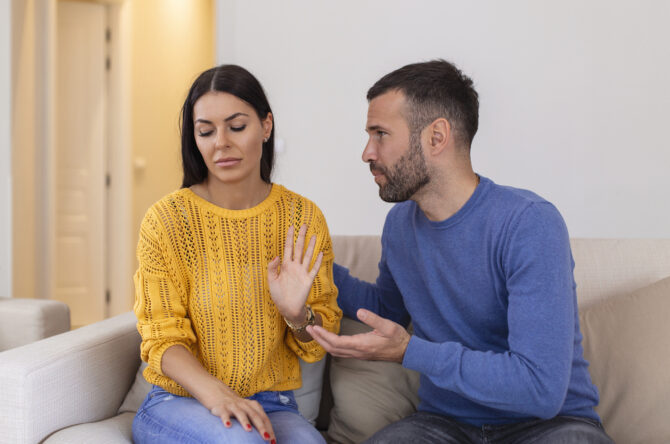When someone hurts you, an apology should feel sincere, not like they’re trying to avoid responsibility or just make the situation disappear.

Of course, some people avoid any real accountability by using words that sound like an apology but don’t actually acknowledge the harm they caused. The things they say are all about passing the buck, dismissing the other person’s feelings, or making the whole thing about themselves instead. If you’ve ever received one of these, you know how frustrating it can be when someone refuses to truly own their behaviour.
1. “I’m sorry you feel that way.”

At first glance, this might seem like an apology, but it doesn’t actually acknowledge what they did wrong. Instead of taking responsibility, they’re making your emotions the issue, as if the problem isn’t their behaviour but your reaction to it. It’s a clever way of flipping the focus away from themselves while still appearing polite. A genuine apology wouldn’t make it about how you feel — it would acknowledge the action that caused those feelings. Instead of deflecting, they should be saying something like, “I’m sorry for what I did. I understand why it hurt you.” That difference matters because it shows they actually understand why you’re upset.
2. “Well, I didn’t mean to upset you.”

Intentions and impact aren’t the same thing. Just because they didn’t set out to hurt you doesn’t mean they didn’t. This is often used to dismiss the other person’s feelings, as if the only thing that matters is what they intended, not the actual effect their actions had. When someone genuinely cares, they acknowledge the harm they caused, regardless of whether it was deliberate. Instead of brushing it off, a real apology would sound more like, “I didn’t mean to hurt you, but I can see that I did, and I’m really sorry for that.” That small change makes all the difference.
3. “I guess I’m just a terrible person, then.”

This isn’t an apology, it’s a guilt trip. Instead of addressing what they did, they’re flipping the situation to make you feel bad for holding them accountable. It’s a way of avoiding responsibility by making the conversation about their self-pity rather than your feelings. When someone does this, they’re hoping you’ll rush in and say, “No, no, you’re not a bad person,” instead of staying focused on what actually happened. A real apology wouldn’t be dramatic or self-punishing — it would be honest, direct, and about making things right.
4. “Can we just move past this?”

This is less of an apology and more of an attempt to hit the fast-forward button. It’s what people say when they don’t want to deal with the discomfort of taking accountability. Rather than addressing what went wrong, they’re hoping to sweep it under the rug so they don’t have to talk about it anymore. Moving forward in a relationship is only possible when the problem has been properly addressed. If someone truly wants to make amends, they wouldn’t try to rush past the conversation — they’d be willing to sit in it and work through it with you.
5. “I’m sorry, but you know how I am.”

Apologising shouldn’t come with an excuse attached to it. This is usually used to justify bad behaviour rather than take responsibility for it. By saying this, they’re making it sound like their actions are inevitable, as if they can’t help it and therefore shouldn’t be held accountable. A real apology wouldn’t try to pass their behaviour off as a personality trait. Instead of saying, “That’s just who I am,” they should be saying, “I know I’ve done this before, and I need to work on it.” Accountability means recognising that change is possible — and necessary.
6. “I said I was sorry — what more do you want?”

Apologies aren’t supposed to be a transaction where you say the words and instantly get forgiveness in return. This makes it sound like an apology is just another box to check, not something meaningful. It also implies that if you’re still upset, you’re the problem. Genuine apologies come with patience and an understanding that making things right takes time. Instead of demanding immediate forgiveness, they should be asking what they can do to repair the harm caused.
7. “I’m sorry, but you’re overreacting.”

If someone apologises while also telling you that you’re being too sensitive, it’s not a real apology. This one invalidates your feelings while pretending to acknowledge them. Instead of taking responsibility, they’re subtly suggesting that the problem isn’t their actions — it’s how you reacted to them. Real apologies don’t come with conditions or dismissals. If someone genuinely regrets what they did, they won’t try to convince you that you shouldn’t be upset about it.
8. “I’m sorry if I did something wrong.”

The word “if” makes this whole sentence meaningless. It suggests they’re not even sure they did anything wrong, which means they’re not actually owning up to anything. It’s the kind of thing people say when they want to sound apologetic without actually admitting fault. Real accountability means being clear about what they’re sorry for. Instead of saying, “if,” they should be saying, “I understand that I hurt you when I did this, and I’m sorry.” That clarity is what makes an apology feel real.
9. “You know I didn’t mean it like that.”

Even if their intentions were good, that doesn’t erase the harm caused. This tries to shift the focus onto how they meant it rather than how it was received. It can make the other person feel like they’re being unreasonable for reacting the way they did. A better response would be, “I didn’t intend to hurt you, but I see that I did, and I’m sorry for that.” That small shift in wording makes all the difference between an excuse and a real apology.
10. “Fine, I’m sorry. Happy now?”

There’s nothing sincere about an apology said through gritted teeth. When someone says this, they’re not apologising because they mean it — they’re apologising because they feel pressured into it. It’s more about ending the conversation than actually making amends. An apology should never feel like a performance. If someone truly cares about making things right, they won’t say it with frustration or resentment.
11. “I don’t know why you’re making such a big deal out of this.”

This completely disregards the other person’s feelings. It suggests that the issue isn’t what they did, it’s the fact that you’re upset about it. It’s a way of making the other person feel dramatic for even bringing it up. If someone truly regrets hurting you, they won’t try to minimise it. Instead of saying, “It’s not a big deal,” they should be saying, “I see that this hurt you, and I want to understand why.”
12. “I hate when we fight like this.”

While this might sound like a good thing, it’s actually a way of avoiding responsibility. It shifts the focus from the issue at hand to the argument itself, as if the real problem is that you’re upset, not what they did. Instead of focusing on how much they dislike conflict, they should be focusing on what caused it in the first place. A real apology means addressing the root of the issue, not just wanting to move past the uncomfortable part.
13. “I’ll just keep my mouth shut next time.”
 Source: Unsplash
Source: Unsplash Rather than taking responsibility for what they said, this makes it sound like the real issue is that they spoke at all. It’s passive-aggressive and shifts the blame onto you, as if your feelings are the problem rather than their words or actions. Instead of acknowledging what went wrong, they’re making themselves the victim. A sincere apology doesn’t involve making the other person feel guilty for speaking up. If they truly regret what they said, they wouldn’t act like the only solution is silence — they’d take accountability for why their words were hurtful in the first place.
14. “I don’t even remember saying that.”

Whether or not they remember doesn’t change the fact that it happened. This can make you feel like you’re exaggerating or misremembering the situation, which is a form of gaslighting. It subtly suggests that if they don’t recall it, it must not have been a big deal. Even if they genuinely forgot, a real apology wouldn’t dismiss your experience. Instead of saying, “I don’t remember,” they should be saying, “I trust what you’re saying, and I’m sorry that I hurt you.” That small difference makes it about accountability rather than doubt.
15. “Let’s just forget this happened.”

This isn’t an apology, it’s an attempt to erase the issue entirely. It sends the message that the best way to handle the problem is to ignore it rather than resolve it. While it might seem like they want to move on, skipping over accountability just guarantees the same thing will happen again. Moving forward isn’t about pretending something didn’t happen — it’s about addressing it and doing better next time. A real apology wouldn’t involve avoiding the conversation, but actually having it, no matter how uncomfortable it may be.




